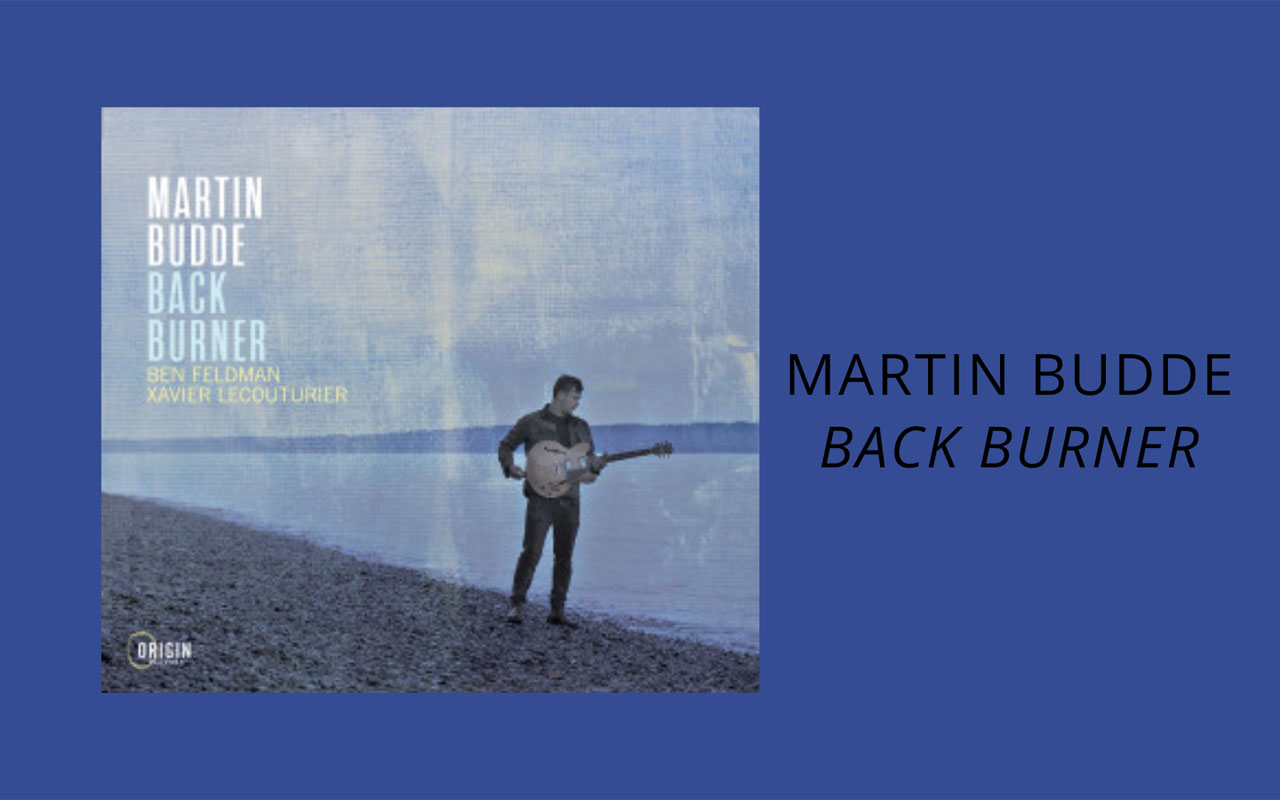
Origin Records, March 2024
Despite jazz’s embrace of standards, there’s nothing “standard” about jazz album art. From dim-lit interiors, think Miles Davis’s Kind of Blue to psychedelic desertscapes, Herbie Hancock’s Sextant — the principal role of a record cover is to hint at the musical aesthetic within. Seattle-based guitarist Martin Budde’s Back Burner, out from Origin Records earlier this year, aces the test.
Budde, 28, is a founding member of bicoastal sextet Meridian Odyssey. He’s joined on Back Burner by bassist Ben Feldman and drummer Xavier Lecouturier, both bandmates. The album cover shows Budde alone with his Gibson ES-335 on the coastline of Burien’s Seahurst Park, his body framed by gravelly beach, tranquil waters, and the distant Vashon hills. It’s an overcast day. Budde contemplates his frets.
Back Burner is a case study in bucolic soundscapes and rich, undulating dynamics showcasing Budde’s playing with remarkable purity of sound. Feldman and Lecouturier lay down wide, ride-heavy pockets while Budde handles melodic movement and provides some of his own harmonic accompaniment, grabbing bass notes and chordal resolutions mid-phrase à la Bill Frisell or Julian Lage.
The record’s nine tracks includes a cover of Joni Mitchell’s “My Old Man.” Album opener “Red” provides a representative sonic template, with Budde running sprightly up his neck during the head and falling back down for a series of syncopated chords for the bridge. His semi-hollow body Gibson sounds nearly acoustic at times, the plucking attack on his strings reminiscent of fellow Northwesterner Miles Okazaki.
Title track “Back Burner” provides a compositional formula which Budde follows multiple times on the record: a solo chordal melody at the outset with Feldman joining in midway, and Lecouturier jumping in for the improvisation. In “Back Burner,” the rhythm section takes up a gentle 2/4 feel and Budde switches from his Gibson to a Telecaster, dialing up the reverb to highlight his dexterity on the fretboard. His Tele furthers the aforementioned Lage comparison, and Budde’s soloing is a playful, mixolydian-style exercise, easy for cross-genre listeners to digest.
Tracks like “Companion” and “Consensus” dig deeper into the jazz side of Budde’s composition. Despite the unaffected sound of individual instruments, the melodies are increasingly modern and the band’s dynamics sway like the best parts of a Bad Touch album. Mid-record showstopper “Gee Gee Blues” features bebop-lite runs in the melody before stretching out into a more luxurious bridge.
Meanwhile, the album’s lone cover, Joni Mitchell’s “My Old Man,” functions to anchor the album’s creative angle and tie a bow on Budde’s pristine finger work. Mitchell’s melodies, like Budde’s, are buoyant yet oddly askew. When the poignant, Lydian lead line (“We don’t need no piece of paper from the city hall”) drops in over Feldman’s sparse backing, Mitchell’s hollow-cheeked portrait from Blue – talk about representative album art – leaps into mental focus. Budde is a guitarist to keep an eye on.